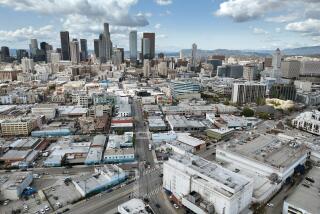CitizenM builds hotels with Lego-like modules. One is about to open in L.A. amid COVID
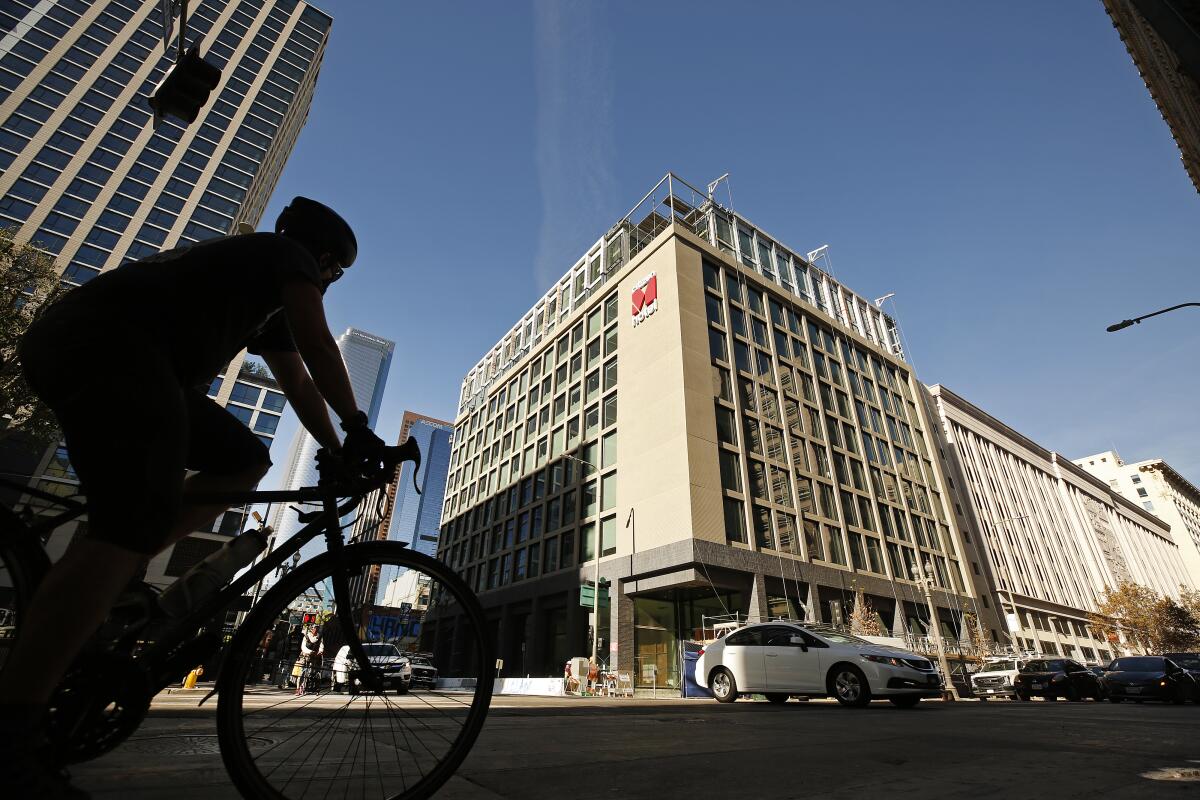
Work is nearly finished in downtown Los Angeles on CitizenM, a hip hotel for international travelers made of prefabricated rooms that were craned into place like a child’s building blocks.
The Dutch developers who launched the project before the pandemic are not rushing to open its doors, but they have carried on building in anticipation of a time when people will again venture from city to city for fun and to try new restaurants and strike up conversations in hotel lobbies with friendly strangers.
“One thing people miss being locked up in isolation for such a long time is social interaction,” said Menno Hilberts, who oversees development for CitizenM. “I do expect that once people are able to travel again that there will be some catching up.”
CitizenM points to its modular construction approach — like high-stakes Lego — as one reason the company is able to keep costs low and charge less for rooms than its rivals as it looks ahead to a post-pandemic world.
But as Christmas approaches, downtown L.A. is distinctly devoid of cheer. Office skyscrapers are nearly empty as most companies keep their employees Zooming at home, and bars and restaurants are locked by county edict to slow the spread of COVID-19. Encampments of homeless people have spread well beyond their pre-pandemic bounds.
The blocks around CitizenM in the Historic Core appear dingy and vacant, starved of the crowds of daily office workers and nightly revelers who pumped life into the old neighborhood before the pandemic. City Hall and courthouses in the nearby Civic Center that drew daily throngs are practically lifeless.
“People are scared, and foot traffic is down to almost nothing,” office landlord Christopher Rising said, with downtown’s daytime workday population of about 500,000 mostly gone. “It feels a little bit like a zombie apocalypse.”
Those who look upward, though, will see that building construction — considered an essential business by public officials despite the pandemic — is carrying forward on nearly every downtown project started before the pandemic, including the $1-billion Grand apartment, hotel and restaurant complex designed by architect Frank Gehry across Grand Avenue from Walt Disney Concert Hall.
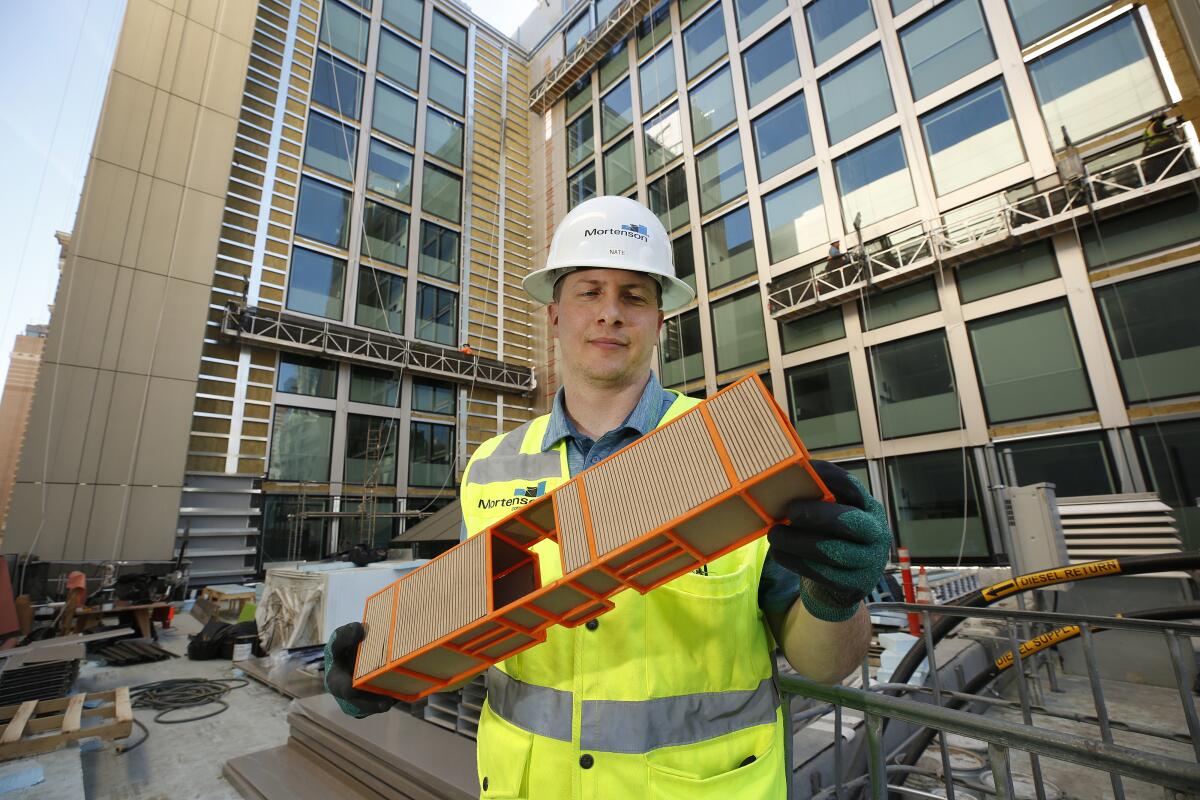
Rising predicted that people who return downtown in March and April as COVID-19 fears ease will be surprised to see new developments such as the Grand and CitizenM. The massive Grand, which is close to reaching its peak of 39 stories, won’t be finished until 2022.
The 11-story CitizenM rose more quickly than most buildings because it was built by stacking modules on top of one another, an evolving construction method promising efficiency that is still a rarity in Los Angeles.
Modular hotel construction can shave several months off construction, the developers said, which reduces overall costs. The CitizenM will be finished between July and January, a speedy delivery for a new 315-room hotel.
CitizenM built its first modular hotel in Amsterdam in 2008. The new downtown L.A. CitizenM is its third modular hotel in the U.S. and the first modular high-rise in Los Angeles, Hilberts said.
Material costs are about the same as conventional construction, said Nate Jenkins, an executive at Mortenson, the construction company building CitizenM at 361 S. Spring St. “The advantage is in the speed” with which a hotel can be put together from the ground up.
In the case of CitizenM, preliminary work began in Jiangmen, an industrial city in China’s Guangdong province near the South China Sea. In a factory owned by CIMC, one of the world’s largest manufacturers of shipping containers, workers assembled modules about the same size as standard freight containers — 54 feet long and 8 feet wide.
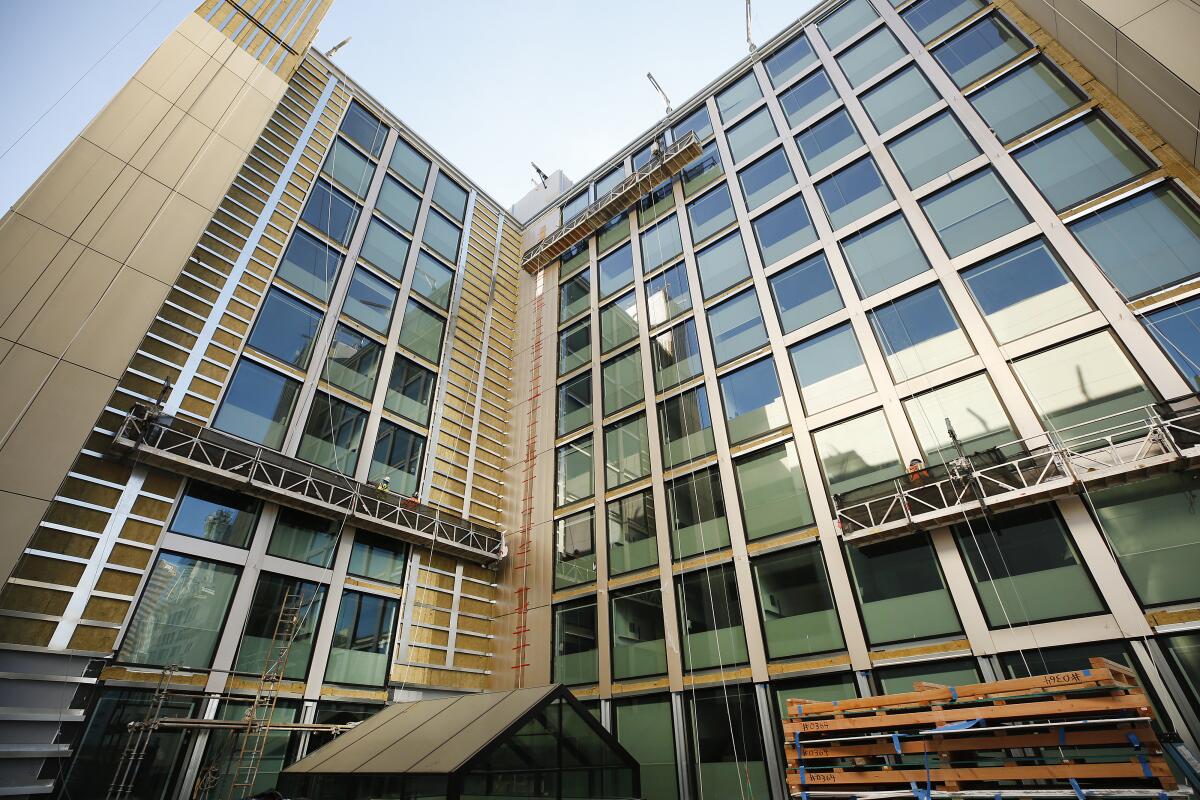
The repetitive elements of hotel rooms make modular construction particularly well suited to hotel development, advocates say.
CitizenM modules consisted of two bedrooms framed in steel, separated by a hallway and enclosed like a shoe box. Millwork and fixtures are attached, including a bed frame for a king-size bed, work desk, vanity and bathroom. The rooms are acoustically separated by their steel frames and casings, which make them quieter than conventional hotels that share walls, according to CitizenM.
Mortenson had quality-control supervisors working with the unit builders in Jiangmen, Jenkins said, and California state inspectors examined them there to make sure they met building codes on this side of the Pacific. The completed modules traveled by containership to the Port of Los Angeles, where they were loaded onto trucks and brought to the job site at 4th and Spring streets.
One by one, the modules were craned into position on a foundation laid to hold them. Water and electrical connections were made through the hallways, and a brick-and-concrete facade was added outside. The building does not have a garage, but CitizenM has a contract to provide valet parking next door.
Rooms have floor-to-ceiling windows, but they are small by industry standards. They are also cheaper to rent. CitizenM bills its inns as “affordable luxury,” and the rooms are typically 30% to 40% less expensive than those of its competitors, Hilbert said.
The hotelier expects that guests will use their rooms primarily for sleeping, with CitizenM’s shared lobby area acting as their living room and office.
Packaged meals are available, but most guests eat at nearby restaurants because the hotels are in urban centers. Movies and Wi-Fi are included in the room fee. Guests check themselves in on a computer and schlepp their own bags.
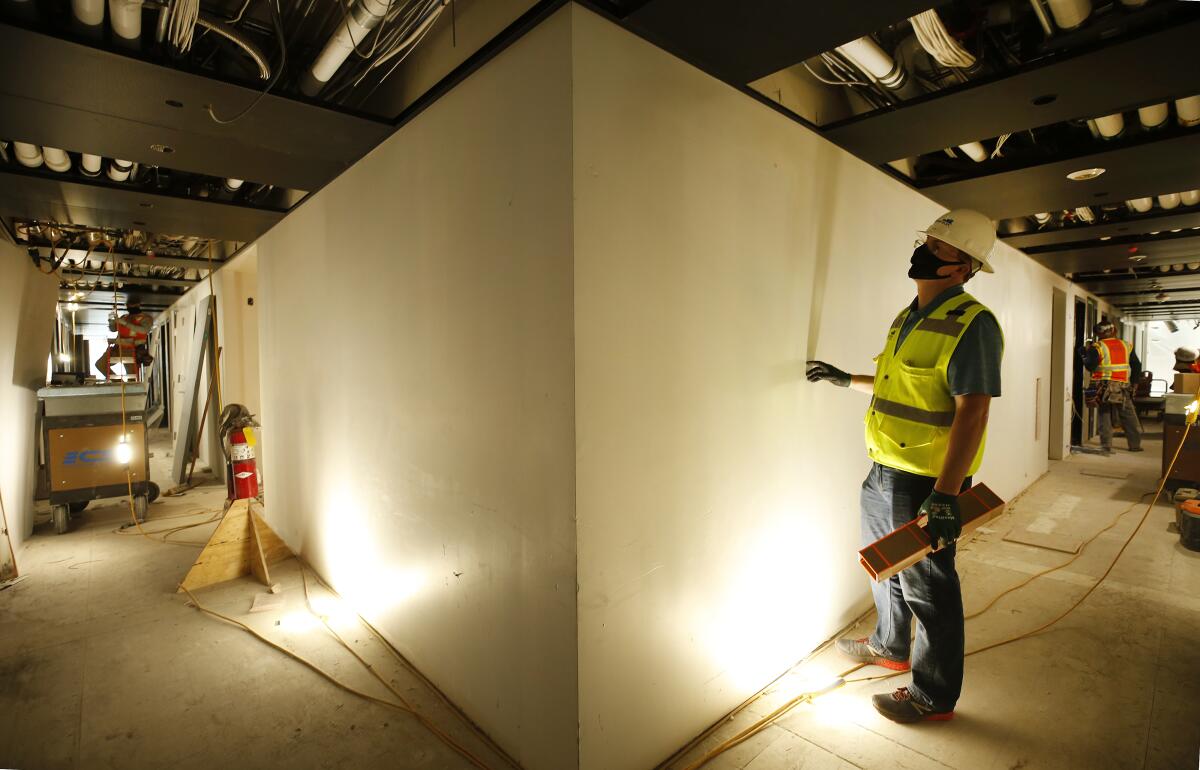
The hotel style is part of a trend by hotel operators to cater to millennials, a growing segment of the travel industry. Jenkins said CitizenM’s guests are “mobile citizens,” who travel frequently to urban centers near public transportation such as downtown Los Angeles.
“CitizenM is going to bring in international travelers in ways other hotels haven’t,” said Rising, who is not involved with the hotel. His company, Rising Realty Partners, co-owns an office building a block away called the Trust Building, an Art Deco-style tower that opened in 1928 as the headquarters of Title Insurance & Trust Co.
L.A.’s offices are mostly empty now, but Rising predicts that people will come back to them when they feel safe from the coronavirus, even if they have the option to work at home.
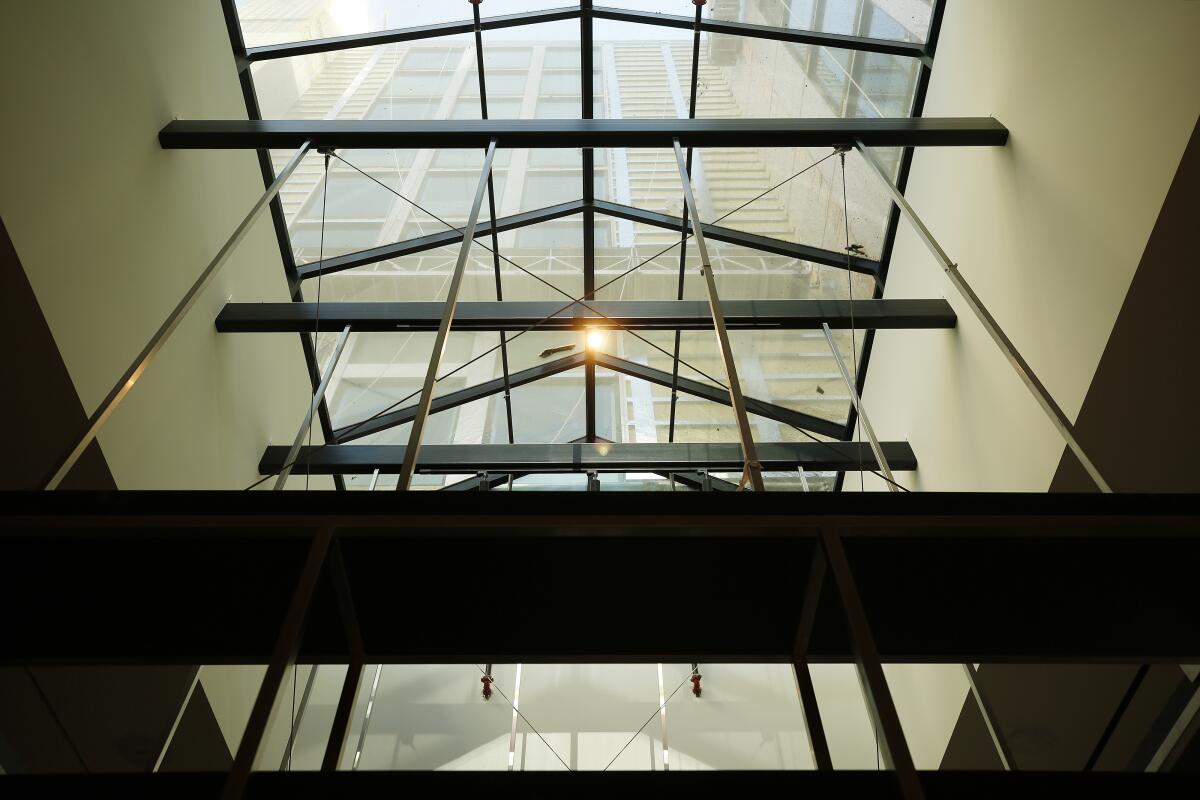
“Gen Z and millennials are going to demand it,” he said. “I don’t think anyone went to college to work in an apartment.”
Rising also predicts young adults will resume traveling when they feel safe, but for now the hospitality business is moribund.
“Hotels are in a holding pattern,” industry consultant Bruce Baltin said, affected in California by a state-at-home order by Gov. Gavin Newsom this month and enhanced by local jurisdictions, including Los Angeles County.
Hotel occupancy was starting to pick up a bit before the latest lockdown, he said, “but not by much.”
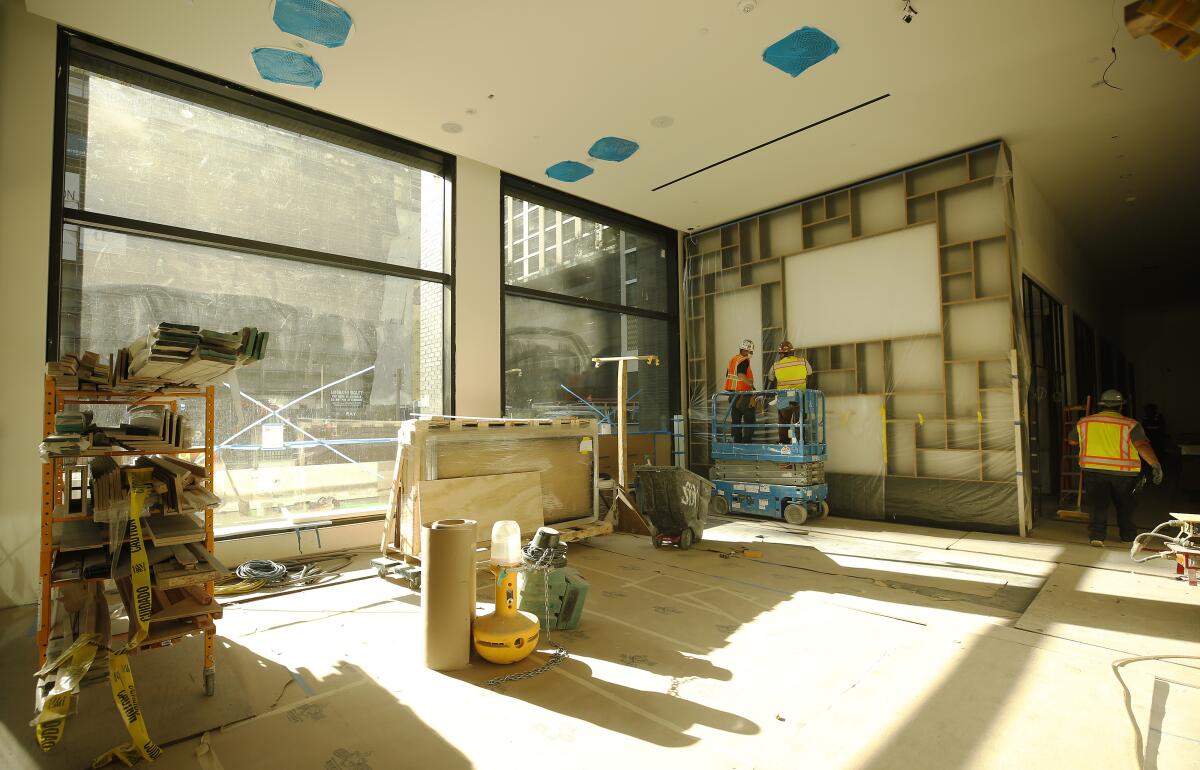
The pre-pandemic push to build new hotels has slowed, Baltin said.
“Most hotels under construction are delaying their openings as much as they can because of the market,” he said. “Work is continuing, but slowly, as they keep costs down as much as possible.”
CitizenM will open in late spring or early summer, Hilberts said, “providing COVID doesn’t get any worse.”
Also moving at a deliberate pace is work on the nearby Cambria hotel, an upmarket inn next door to the Trust building intended to appeal to business travelers. The hotel is being created in a 13-story building erected as a fancy parking garage in 1928, when Spring Street was considered the “Wall Street of the West.”
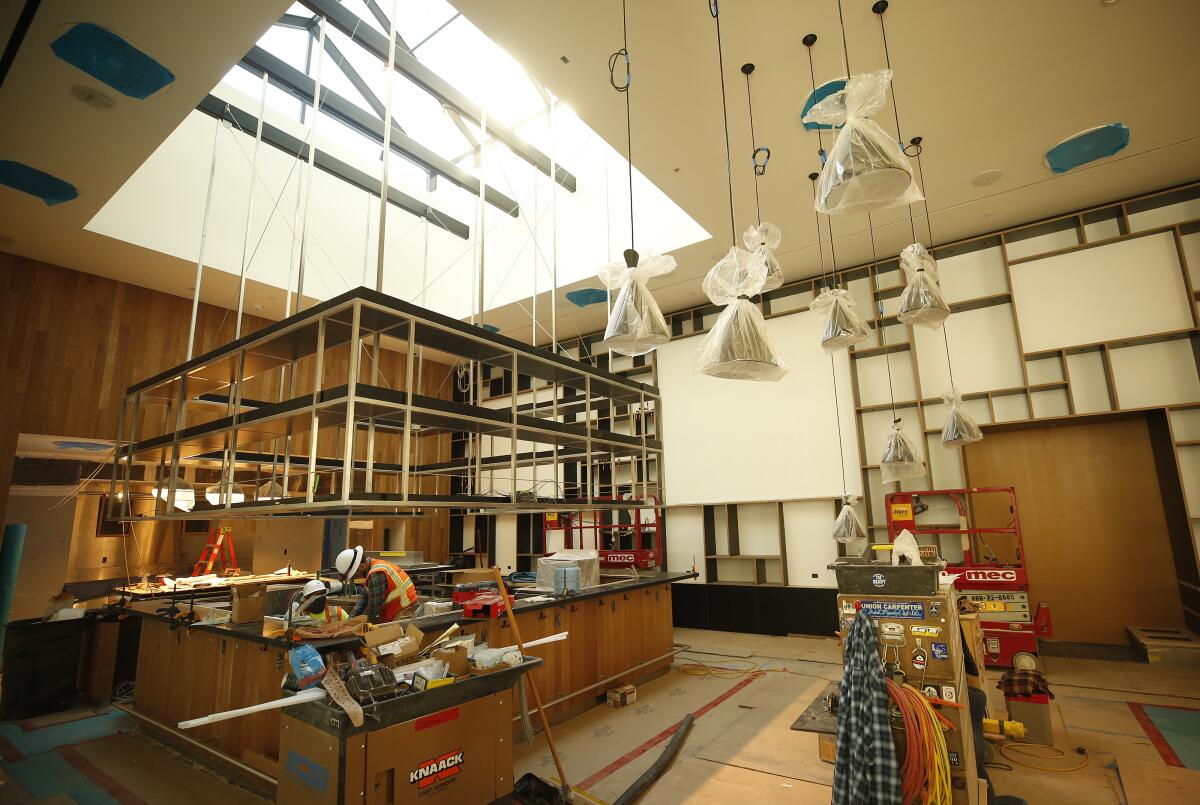
The Cambria was once slated to open this year but is now set to open in the fourth quarter of 2021.
Also near the CitizenM is the 34-story Perla residential tower at Broadway and 4th Street, which was planned in 2015 and is nearly complete as work continued through the pandemic.
“Obviously, we weren’t going to stop,” said Hamid Behdad, president of Central City Development Group, which is developing the 450-unit condominium complex.
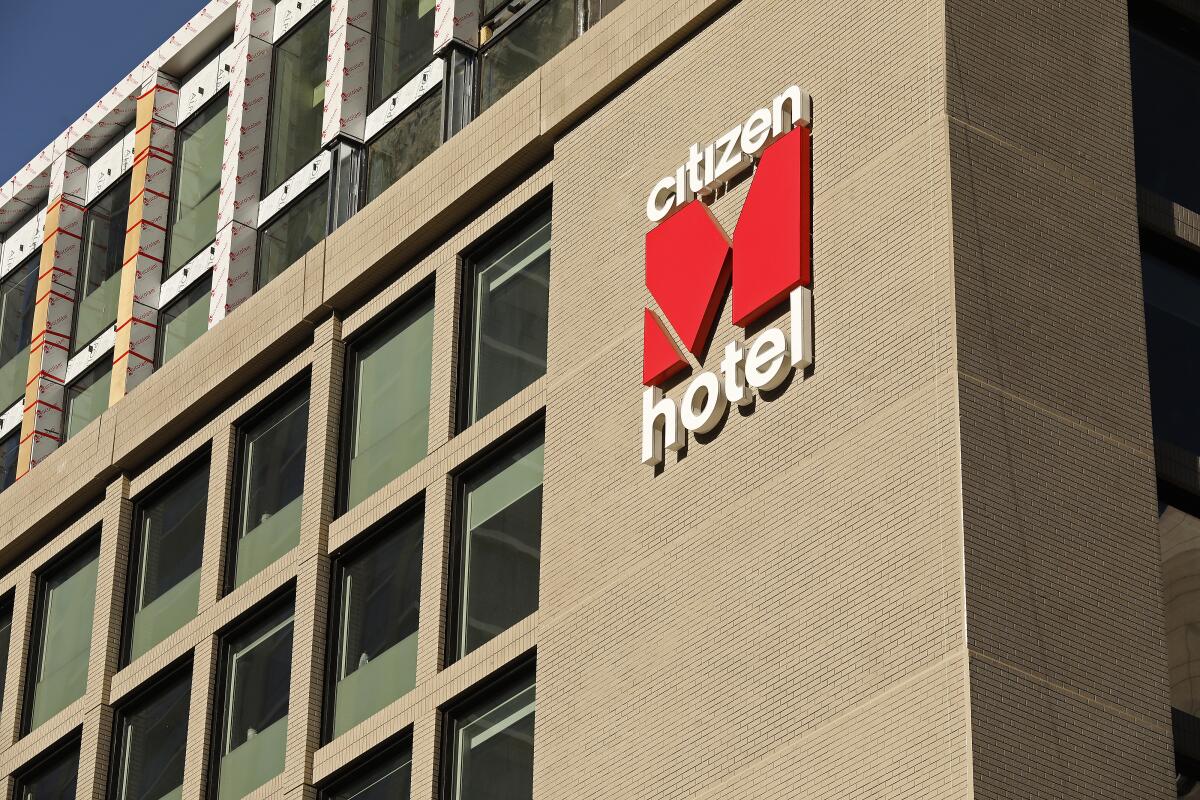
Perla recently secured a temporary certificate of occupancy from the city, he said, and residents will move in early next year.
In escrow are about 200 units, nearly all of which were sold before the pandemic hit and the developers were forced to close their sales office.
“We’re definitely counting on a post-COVID world,” he said. “At the beginning of the year, we should see some light at the end of the tunnel.”
More to Read
Inside the business of entertainment
The Wide Shot brings you news, analysis and insights on everything from streaming wars to production — and what it all means for the future.
You may occasionally receive promotional content from the Los Angeles Times.

